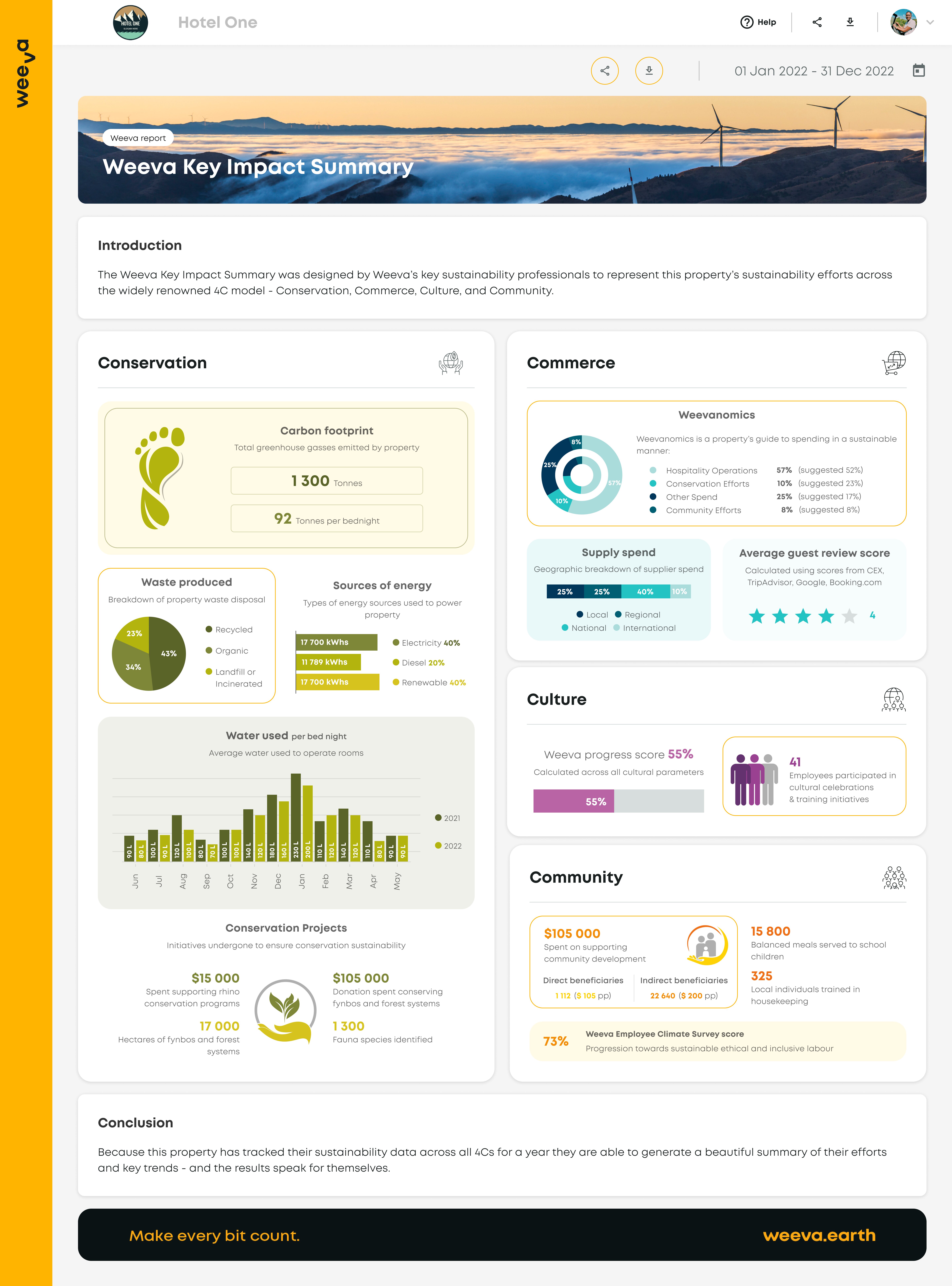Tracking sustainability has never been more important


Synopsis
Julie Cheetham's article highlights the critical role of sustainability and ESG in the travel and tourism industry, particularly in hotels, where guests increasingly demand tangible evidence of eco-friendly practices. Emphasizing the need to move beyond superficial 'greenwashing', it advocates for benchmarking as a key tool in validating sustainability claims using real data. This approach includes measuring basic environmental impacts and extending to broader socio-economic contributions. The piece underscores the complexity of sustainability and the importance of local context in measuring impact. It also discusses the role of technology, particularly platforms like Weeva, in facilitating sustainability management, providing comprehensive data analysis, and supporting informed decision-making. Ultimately, the article argues that accurate sustainability tracking and continuous improvement are essential for the industry's genuine commitment to positive environmental and social impact.
Positive impact from travel and tourism industry abounds — from vital job creation in rural areas and the much-needed conservation of biodiversity in ecologically important regions. Earlier this year, the World Travel and Tourism Council (WTTC) estimated that by 2033 the industry will contribute US$ 15.5 trillion to global Gross Domestic Product (GDP). With this huge figure in mind, it is necessary to responsibly steer this growth in a direction that is sustainable and use data to power business decisions.
The industry is under intense scrutiny when it comes to what is truly eco-friendly, and who is inclusive, and committed to reducing carbon emissions. For hospitality specifically, sustainability is no longer just a buzzword; guests and travelers expect clear evidence of green practices with no room for greenwashing — and who can blame them?
Benchmarking has emerged as a crucial tool in validating sustainability claims, using real data to counter any accusations of greenwashing. But how does it work in the context of sustainability within the broader travel and tourism industry?
Understanding benchmarking and getting started with data-tracking
We need to tackle any perceptions that climate action is for a select few travel and tourism businesses that can afford to employ dedicated sustainability teams or consultants. All businesses – regardless of size – should have access to the knowledge and expertise required. Benchmarking is like a measuring stick for businesses. It allows them to compare their performance against competitors to see how well they’re doing and to keep them accountable to standards. By analysing organisational data, we can identify patterns, trends, strengths, and weaknesses to see how our businesses perform. This information is then compared to other destinations, hotels or other segments of the industry to gauge performance. For hotels, as we know, the Cornell Hotel Sustainability Benchmarking (CHSB) Index compares competitor data as a way of judging success.
A lot of the time, the ability to collect and start managing this data can be the tallest hurdle for business owners keen to take positive steps forward.
Collaboration and assessing performance against peers is a priority — but hotels and hospitality properties need to go beyond comparing themselves and noting where competitors are outperforming them. Benchmarking is not just about gathering data for comparative reasons; it's about using feedback to identify areas for improvement. Tools for monitoring and evaluation should be employed continuously to help make necessary improvements and create meaningful results that are of genuine benefit to people and the planet.
Sustainability is complex and contextual
Many hospitality properties start their sustainability journey by measuring the basics such as energy consumption, emissions, water usage, waste, and community welfare to determine their impacts, positive and negative. As touched on, there are tools designed to help tourism entities measure this, allowing them to understand their current usage, and then establish goals for improvement. In our industry, there are membership and standards bodies advocating for change in how businesses report and measure impact — but who to trust and how are they helpful? The Sustainable Hospitality Alliance has been pushing for standardisation for some time, but the vast array of reporting and certification systems out there can be difficult to comprehend, never mind action: but we can’t manage or improve what we don’t yet know. Taking on sustainability reporting can also be daunting — but immeasurably helpful, in the short and long term.
Going beyond carbon
While parameters provide a good starting point, the impact of local tourism and hospitality businesses goes far beyond what they reveal. Operational decisions not only affect natural environments, but they also have profound implications for surrounding communities. Even urban-based properties can catalyse local economies by supporting local suppliers, community projects, and vulnerable groups, thereby enhancing the experience of guests.
When we consider the impact in low- and lower-middle-income countries, the travel and tourism industry plays a pivotal role in enhancing economies, where it's estimated that for every job created within the industry, three more jobs are generated downstream. As an industry, creating jobs, especially among women and young people, is key to fostering inclusive, thriving communities.
Communicating sustainability results
Certifications, especially those audited by an independent third party, and recognised by the Global Sustainable Tourism Council (GSTC), are a valuable way to recognise the sustainability efforts of travel and tourism businesses. However, certification can often be a sporadic indicator at a specific point in time, and not track ongoing efforts or improvements over months and years. The key to substantiating sustainability claims and celebrating successes lies in having real data to rely on. Over time, we can measure both the positive and negative impacts of our operations. The data doesn’t lie, and so we are able to see trends emerge, identify areas for improvement, and ultimately set targets for reducing our overall footprint. Idealistic pledges and commitments are a great start, but consistent, measurable results are required.
How can ‘SusTech’ help?
Weeva has developed a sustainability management platform based on The Long Run’s 4Cs sustainability framework. The platform, operating like a sustainability officer in your pocket, assists hospitality properties and other travel and tourism businesses in measuring their conservation, community, culture, and commerce footprints, providing a holistic view of their performance in each area. With 18 parameters — from employee learning and development to business transparency, and ethical procurement — businesses are equipped with the tools they need to measure their impact. We call this our 360° Framework.

Technology’s role in supporting data-led benchmarking
Weeva acts as a data-ingestion engine that allows users to track and monitor their progress over time. The platform offers users tools to visualise their data through charts and graphs. Regular reviews enable users to identify patterns in their business models and set targets for reductions with gamification features that prompt and alert users to input data and to help keep them on track. Depending on the parameter, users can create unique projects, generate reports, and access educational guides, templates, surveys, and tools. This takes benchmarking into your own hands and is part of our vision to democratise access to sustainability ‘know-how’ that otherwise wouldn’t be available to a business that doesn’t have the time, resources or ability to adhere to sustainability standards.
Having recently unveiled the beta version of our new generative AI features, to be trialled through our platform with existing and prospective users, this allows us to fully integrate the ‘sustainability officer in your pocket’ ethos across the platform once fully adopted. When founding Weeva, we had the belief that the digitalisation of sustainability would be the golden key to help unlock sustainability across the industry. I believe this more than ever as we continue to grow this new offering for the industry.
Here at Weeva, we believe that we can't change what we don't measure and that is why benchmarking and tracking is vital if we are to truly become more sustainable. It's up to each of us to start our own sustainability journey somehow in whatever shape or form that takes. We see ourselves as an instigator for best practice when it comes to sustainability monitoring and evaluation. We want to empower businesses to simply start tracking their sustainability. No matter how big or small, every step counts.